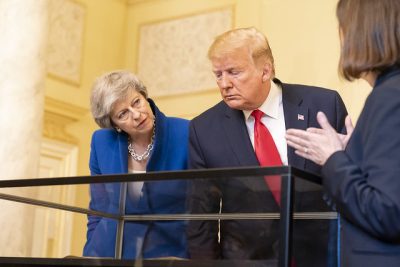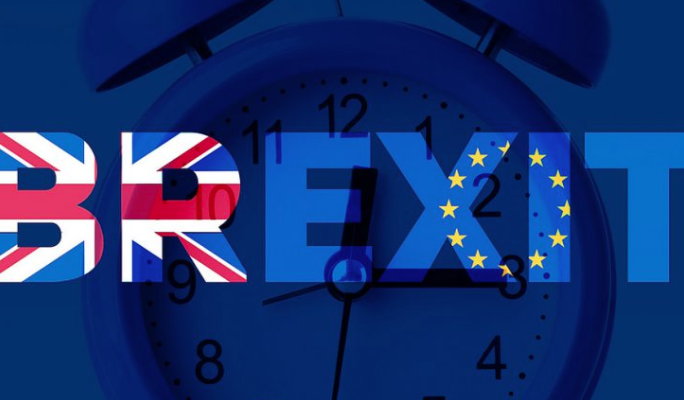Trump’s Visit to the United Kingdom: The “Special Relationship”, Post Brexit Future, Upholding “Western Civilization” … against Russia

Trump’s first-ever state visit to the UK was a monumental event that celebrated the history of these two Great Powers’ “Special Relationship” and also hinted at what the post-Brexit future has in store for each of them, specifically concerning the so-called “Clash of Civilizations” that American strategists are striving to implement all across Eurasia.
There’s been non-stop news coverage over the past couple of days about Trump’s first-ever state visit to the UK, with journalists focusing on practically all dimensions of his trip. The President’s tweets were given their due attention as always, as was the seating protocol during the huge state dinner that was hosted in his honor. Gossip abounded as usual and countless folks were on the edge of their seats waiting to see how the man who’s perhaps the most undiplomatic Western leader of modern times would behave around the Royal Family that’s known for their prioritization of diplomatic protocol.
Trump’s supporters saw his visit as an endorsement of Brexit, while his critics asserted that he should never have been invited at all. The entire event was both polarizing but also awe-inspiring since it captivated the imagination of the entire nation, for better and for worse, and will certainly go down in history as a monumental trip.
Looking beyond the intangibles such as the overall mood and the disproportionate attention given to the President’s tweets about London Mayor Sadiq Khan and Meghan Markle, there were three main highlights of his visit: the talk about a post-Brexit US-UK trade deal, the emphasis on how common values and shared interests unite the two Great Powers, and the 75th D-Day commemorative event. About the first, it’s well known that Brexit is in jeopardy and that many of the country’s citizens are very concerned about the possibility of leaving the EU without first striking a deal with Brussels. Trump sought to assuage their unease by discussing the possibility of a mutually beneficial trade pact in that event, which is enticing for Brexit’s supporters but certainly won’t endear its opponents to this process. The US leader at one time suggested that the NHS would have to be included in the deal, but promptly backtracked the next day after widespread backlash over what some feared would be its creeping privatization.
Regarding the second main element of Trump’s trip, the emphasis on how common values and shared interests unite the two Great Powers, it was none other than the Queen herself who said this, which therefore bestowed this grand statement with the highest level of normative value possible in that country. It not only explained the soft power basis for the “Special Relationship”, but reinforced the timelessness of their bonds with a view to the future. This is important to dwell upon because it strongly implied that the UK will always be remained allied with America irrespective of however Brexit ultimately plays out.
Her words also took for granted that Western Civilization as a whole includes both the US and Europe despite some very noticeable differences between these two transatlantic halves, which crucially adds another level of significance (whether knowingly or not) to the 75th D-Day commemorative event that wrapped up Trump’s trip.
As the author analyzed in an earlier piece this week, that ceremony was actually a civilizational provocation after over a dozen leaders of the Allied nations (and curiously enough, even Germany) were invited to attend except for President Putin, whose country sacrificed the most out of anyone else’s in the existential struggle against the fascist war machine. This was intended to imply that Russia isn’t part of European/Western Civilization despite its centuries of involvement in continental affairs but is an “other” that doesn’t share its counterpart’s historical memory, whereas the US is evidently a more crucial component of the aforesaid even though it’s only been directly involved in transatlantic affairs since World War I. Keeping in mind what the Queen said about how common values and shared interests unite the US and UK, it’s clear to see that Trump’s trip certainly carried with it a strong degree of civilizational importance in the New Cold War.
Overall, his first-ever state visit to the UK focused on the past and the future of the “Special Relationship”. Brexit was certainly on everyone’s mind, and Trump has made no secret over the years of his support for the country’s divorce from Europe, but at the same time he didn’t seem to overly interfere in the domestic affairs of the host nation any more than the CIA and other forces already do. If anything, the visit was a feel-good reminder to the citizens of both countries about how common values and shared interests unite them, though the dark side of this civilizational focus is that it pits the West (the US, UK, and EU) against all the rest, especially Russia, China, and the Mideast. It’s on this closing note that observers should be most concerned because of the prospect of Trump applying the “Clash of Civilizations” blueprint for dividing and ruling the Eastern Hemisphere throughout the 21st century.
*
Note to readers: please click the share buttons above or below. Forward this article to your email lists. Crosspost on your blog site, internet forums. etc.
Andrew Korybko is an American Moscow-based political analyst specializing in the relationship between the US strategy in Afro-Eurasia, China’s One Belt One Road global vision of New Silk Road connectivity, and Hybrid Warfare. He is a frequent contributor to Global Research.
Featured image: President Donald Trump, along with British Prime Minister Theresa May, viewing a displayed copy of the Declaration of Independence at No. 10 Downing Street Tuesday, June 4, 2019, in London. (Official White House Photo by Shealah Craighead)


